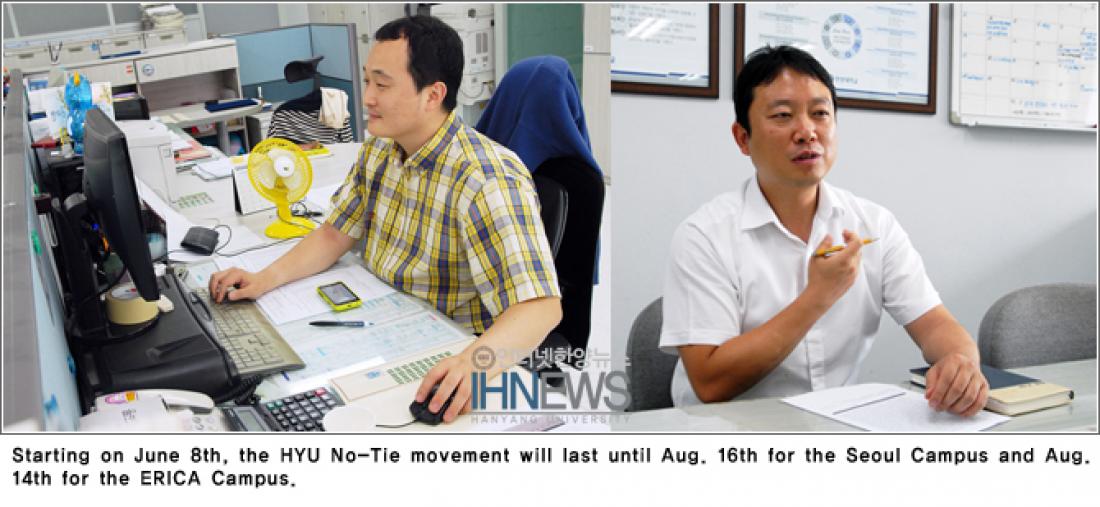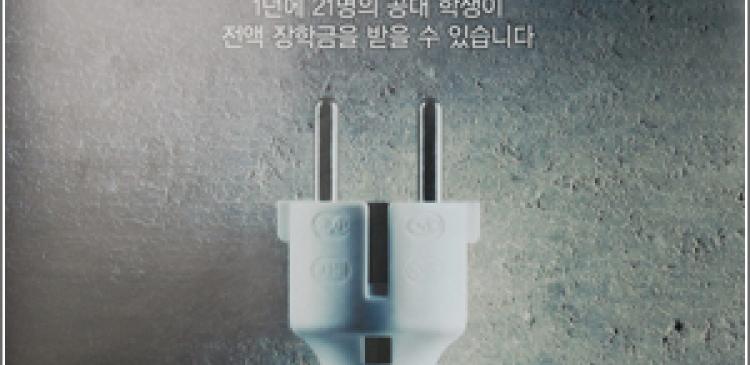©Photo by Hyeonjung Kim
The No-Tie Movement
----------------------------
The Seoul City Government has long promoted a campaign called ‘Cool Biz,’ which is a dress code to wear light clothes in summer, in an effort to realize energy conservation. Originally started in Japan in 2005, the Cool Biz campaign was introduced to Korea in 2009. On June 8th, HYU announced the no-tie dress code to all faculty members. The No-Tie movement is helpful in lowering the body temperature by two degrees Celsius, which will result in less electricity consumption to activate air-conditioners. Consequently, it is contributory to the protection of the environment as carbon dioxide emission is reduced. The HYU No-Tie movement will last until Aug. 16th for the Seoul Campus and Aug. 14th for the ERICA Campus. Seungjoo Kim of the Office of General Affairs said, “It feels a lot more comfortable and cooler to go to work without a tie.” President Duck-Ho Lim also follows the Cool-Biz movement when he does not have any public schedule, staying in his office.
Air-Conditioning Management on Campus in Summer
-------------------------------------------------------------------
The campus air-conditioning runs from 8am to 5:30pm; however, the Facility Operations Team allows it until 9pm where there is a request to lengthen the time for research or extra classes. The indoor temperature of HYU is fixed as well. Last year, it was set to keep 27 degrees Celsius for administration offices, and 26 for lecture rooms. This year, 2012, the lecture rooms’ temperature stands at 25 degrees Celsius, which is slightly lowered compared to last year, and the administration offices’ temperature stays the same as last year. According to Janggon Kim, team manager of the Facility Operations Team, commented, “If we lower the indoor temperature by at least 0.5 degrees Celsius, it can be a significant change that will benefit us all in the near future. Currently, HYU’s energy management scheme is mostly focused on ‘pain-sharing.’ If all faculty members and students understand the situation where we are at and cooperate with each other, we can definitely cope with the upcoming energy problem in 2015 where we should ‘buy’ the right of using energy.”
One thing that has been newly introduced to the energy management scheme at HYU is for each building to pay their own water and electricity bills with autonomous budget. That being said, some departments which spend a tremendous amount of electricity such as the College of Engineering are trying hard to reduce consumption of electricity.
Other Energy Management Schemes at HYU
---------------------------------------------------------
Several Korean universities have been surprised at HYU’s energy-saving and management plan that some of them even benchmarked the plan. Besides the No-Tie Movement and air-conditioning management in summer, following are other energy management plans that are currently on the process as of 2012:
1) Energy-saving advertisements will be more publicized to encourage cooperation.
2) The energy controlling system by occupants schedule will be soon installed in every building at HYU, except for labs.
3) Elevators will be run by odd or even numbered floors taking turns.
4) Campus lightings will be replaced by Light Emitting Diode (LED) lightings which can be more cost-effective. Outdoor lighting will be mostly turned off. Common use spaces will oftentimes be lighted out based on the floating population.
5) Other than electricity plans, a water-saving device will be introduced to restrooms and shower rooms on campus.
The clincher in achieving the all of the above plans is voluntary participation of all HYU members. The energy plan is not disposable, short-term. Rather, it is based on long-term, consistent plan that all of the HYU members should pay continuous attention and follow the steps together to realize the ultimate goal of HYU and the world.
For more information contact:
--------------------------------------
Ally Jeong
Email: [email protected]
This article is also available in Korean.




